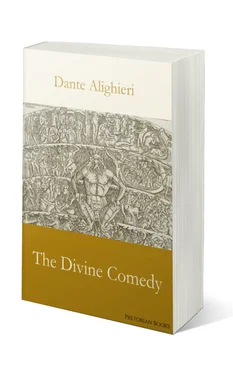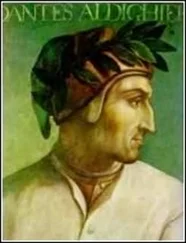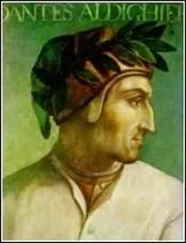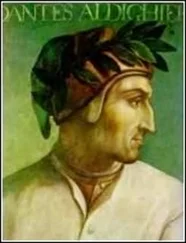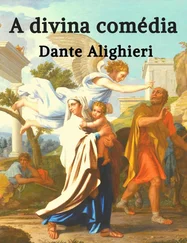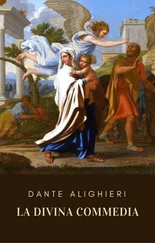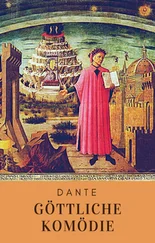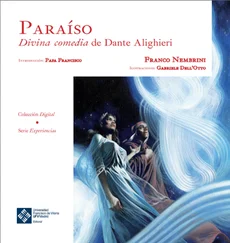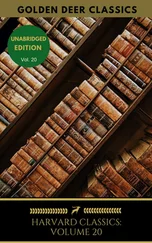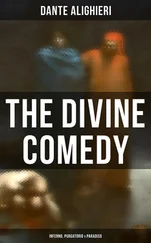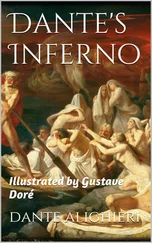Three solar circles; and the other rise
By borrow'd force of one, who under shore
Now rests. It shall a long space hold aloof
Its forehead, keeping under heavy weight
The other oppress'd, indignant at the load,
And grieving sore. The just are two in number,
But they neglected. Av'rice, envy, pride,
Three fatal sparks, have set the hearts of all
On fire." Here ceas'd the lamentable sound;
And I continu'd thus: "Still would I learn
More from thee, farther parley still entreat.
Of Farinata and Tegghiaio say,
They who so well deserv'd, of Giacopo,
Arrigo, Mosca, and the rest, who bent
Their minds on working good. Oh! tell me where
They bide, and to their knowledge let me come.
For I am press'd with keen desire to hear,
If heaven's sweet cup or poisonous drug of hell
Be to their lip assign'd." He answer'd straight:
"These are yet blacker spirits. Various crimes
Have sunk them deeper in the dark abyss.
If thou so far descendest, thou mayst see them.
But to the pleasant world when thou return'st,
Of me make mention, I entreat thee, there.
No more I tell thee, answer thee no more."
This said, his fixed eyes he turn'd askance,
A little ey'd me, then bent down his head,
And 'midst his blind companions with it fell.
When thus my guide: "No more his bed he leaves,
Ere the last angel-trumpet blow. The Power
Adverse to these shall then in glory come,
Each one forthwith to his sad tomb repair,
Resume his fleshly vesture and his form,
And hear the eternal doom re-echoing rend
The vault." So pass'd we through that mixture foul
Of spirits and rain, with tardy steps; meanwhile
Touching, though slightly, on the life to come.
For thus I question'd: "Shall these tortures, Sir!
When the great sentence passes, be increas'd,
Or mitigated, or as now severe?"
He then: "Consult thy knowledge; that decides
That as each thing to more perfection grows,
It feels more sensibly both good and pain.
Though ne'er to true perfection may arrive
This race accurs'd, yet nearer then than now
They shall approach it." Compassing that path
Circuitous we journeyed, and discourse
Much more than I relate between us pass'd:
Till at the point, where the steps led below,
Arriv'd, there Plutus, the great foe, we found.
"AH me! O Satan! Satan!" loud exclaim'd
Plutus, in accent hoarse of wild alarm:
And the kind sage, whom no event surpris'd,
To comfort me thus spake: "Let not thy fear
Harm thee, for power in him, be sure, is none
To hinder down this rock thy safe descent."
Then to that sworn lip turning, "Peace!" he cried,
"Curs'd wolf! thy fury inward on thyself
Prey, and consume thee! Through the dark profound
Not without cause he passes. So 't is will'd
On high, there where the great Archangel pour'd
Heav'n's vengeance on the first adulterer proud."
As sails full spread and bellying with the wind
Drop suddenly collaps'd, if the mast split;
So to the ground down dropp'd the cruel fiend.
Thus we, descending to the fourth steep ledge,
Gain'd on the dismal shore, that all the woe
Hems in of all the universe. Ah me!
Almighty Justice! in what store thou heap'st
New pains, new troubles, as I here beheld!
Wherefore doth fault of ours bring us to this?
E'en as a billow, on Charybdis rising,
Against encounter'd billow dashing breaks;
Such is the dance this wretched race must lead,
Whom more than elsewhere numerous here I found,
From one side and the other, with loud voice,
Both roll'd on weights by main forge of their breasts,
Then smote together, and each one forthwith
Roll'd them back voluble, turning again,
Exclaiming these, "Why holdest thou so fast?"
Those answering, "And why castest thou away?"
So still repeating their despiteful song,
They to the opposite point on either hand
Travers'd the horrid circle: then arriv'd,
Both turn'd them round, and through the middle space
Conflicting met again. At sight whereof
I, stung with grief, thus spake: "O say, my guide!
What race is this? Were these, whose heads are shorn,
On our left hand, all sep'rate to the church?"
He straight replied: "In their first life these all
In mind were so distorted, that they made,
According to due measure, of their wealth,
No use. This clearly from their words collect,
Which they howl forth, at each extremity
Arriving of the circle, where their crime
Contrary in kind disparts them. To the church
Were separate those, that with no hairy cowls
Are crown'd, both Popes and Cardinals, o'er whom
Av'rice dominion absolute maintains."
I then: "Mid such as these some needs must be,
Whom I shall recognize, that with the blot
Of these foul sins were stain'd." He answering thus:
"Vain thought conceiv'st thou. That ignoble life,
Which made them vile before, now makes them dark,
And to all knowledge indiscernible.
Forever they shall meet in this rude shock:
These from the tomb with clenched grasp shall rise,
Those with close-shaven locks. That ill they gave,
And ill they kept, hath of the beauteous world
Depriv'd, and set them at this strife, which needs
No labour'd phrase of mine to set it off.
Now may'st thou see, my son! how brief, how vain,
The goods committed into fortune's hands,
For which the human race keep such a coil!
Not all the gold, that is beneath the moon,
Or ever hath been, of these toil-worn souls
Might purchase rest for one." I thus rejoin'd:
"My guide! of thee this also would I learn;
This fortune, that thou speak'st of, what it is,
Whose talons grasp the blessings of the world?"
He thus: "O beings blind! what ignorance
Besets you? Now my judgment hear and mark.
He, whose transcendent wisdom passes all,
The heavens creating, gave them ruling powers
To guide them, so that each part shines to each,
Their light in equal distribution pour'd.
By similar appointment he ordain'd
Over the world's bright images to rule
Superintendence of a guiding hand
And general minister, which at due time
May change the empty vantages of life
From race to race, from one to other's blood,
Beyond prevention of man's wisest care:
Wherefore one nation rises into sway,
Another languishes, e'en as her will
Decrees, from us conceal'd, as in the grass
The serpent train. Against her nought avails
Your utmost wisdom. She with foresight plans,
Judges, and carries on her reign, as theirs
The other powers divine. Her changes know
None intermission: by necessity
She is made swift, so frequent come who claim
Succession in her favours. This is she,
So execrated e'en by those, whose debt
To her is rather praise; they wrongfully
With blame requite her, and with evil word;
But she is blessed, and for that recks not:
Amidst the other primal beings glad
Rolls on her sphere, and in her bliss exults.
Now on our way pass we, to heavier woe
Descending: for each star is falling now,
That mounted at our entrance, and forbids
Too long our tarrying." We the circle cross'd
To the next steep, arriving at a well,
That boiling pours itself down to a foss
Sluic'd from its source. Far murkier was the wave
Than sablest grain: and we in company
Of the inky waters, journeying by their side,
Enter'd, though by a different track, beneath.
Читать дальше
